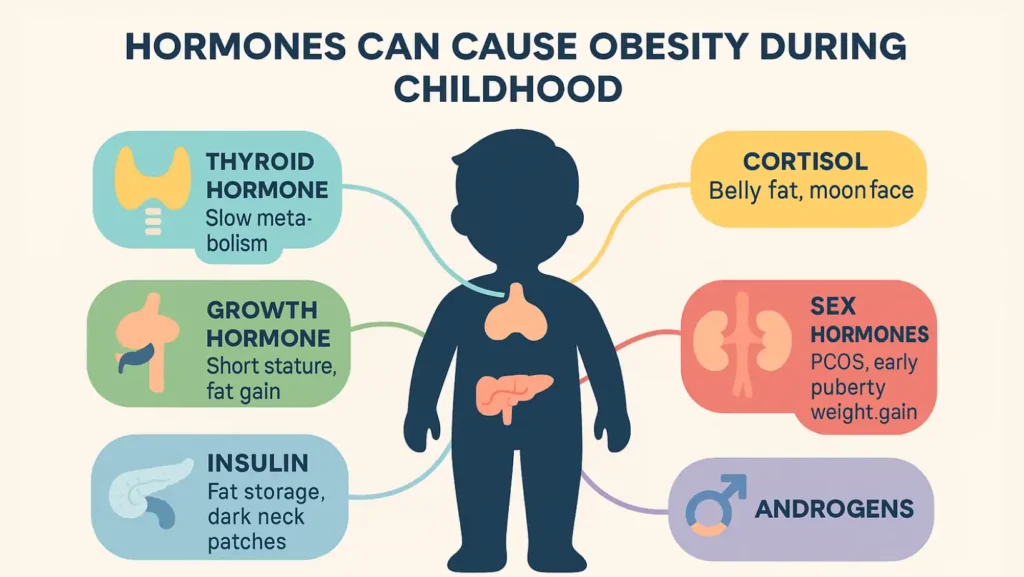Hormonal causes of childhood obesity remain one of the least-discussed yet most important topics for parents and doctors. Many parents think childhood obesity is only about overeating or not exercising. While food and lifestyle matter a lot, hormones quietly shape how a child’s body uses energy, stores fat, and grows. When even one hormone is out of balance, it can tip the scale toward rapid weight gain.
Table of Contents
ToggleThis article explains in detail how different hormones play a role in childhood obesity, why this happens, how doctors diagnose it, and what treatments are available. The goal is to give parents, teachers, and healthcare providers a clear guide that is simple, science-based, and practical.
What Hormones Can Cause Obesity During Childhood?

Hormones are chemical messengers. They control growth, mood, hunger, sleep, and metabolism. If the body makes too little or too much of a certain hormone, the child may gain weight even if their lifestyle is healthy. Below are the main hormones linked to obesity.
Thyroid Hormone
The thyroid gland makes hormones that set the body’s metabolic rate. If the gland is underactive, a child’s metabolism slows. This condition is called hypothyroidism in children.
Signs of low thyroid include:
- Tiredness despite enough sleep
- Slow growth or short height compared to peers
- Swelling of the face or puffiness around the eyes
- Constipation, dry skin, and poor school performance
Doctors use blood tests for T3, T4, and TSH to check thyroid function. If levels are low, thyroid hormone replacement is prescribed. With treatment, metabolism improves, and weight gain often slows down. Parents should know that while hypothyroidism can cause obesity, it is not the most common reason for weight gain in kids. Still, it must be ruled out early.
Cortisol
Cortisol is the body’s stress hormone. In normal amounts, it helps regulate energy. But when levels are high for a long time, fat begins to collect around the belly and face. A child with too much cortisol may have a round “moon face,” thin arms and legs, purple stretch marks, and mood swings.
Conditions that cause excess cortisol include adrenal tumors and Cushing’s syndrome. These are rare but serious. Doctors may run urine, saliva, or blood tests at different times of the day. If an adrenal tumor is found, surgery may be required. In mild cases, medicines that block cortisol can help.
This is why adrenal disorders and obesity are strongly linked. Parents should not assume stress alone is the reason. True cortisol problems need medical attention.
Growth Hormone
Growth hormone not only makes a child taller but also keeps muscle strong and fat low. If a child’s growth hormone is too low, they may become short for their age and have more body fat.
A doctor might suspect growth hormone deficiency if a child grows slower than two inches a year, has a chubby face, and lacks muscle strength. Tests include blood markers and sometimes stimulation tests. Treatment often involves growth hormone injections under careful supervision. When corrected, the child grows better and tends to store less fat.
Sex Hormones
Sex hormones like estrogen, progesterone, and testosterone begin to rise during puberty. If these hormones increase too early or unevenly, weight gain can follow.
A common condition is PCOS and childhood obesity in girls. PCOS (Polycystic Ovary Syndrome) often shows up as irregular periods, acne, and weight gain. High levels of androgens (male-type hormones) cause fat storage around the waist. Boys with early excess androgens may grow facial hair earlier and gain fat quickly.
Tests include hormone panels and ultrasound (in girls). Treatment may involve medicines to balance hormones and guidance on nutrition and activity.
Parathyroid Hormone
This hormone controls calcium levels in the body. High parathyroid hormone can disturb appetite and metabolism, although it is not a common cause of childhood obesity. Doctors test calcium and parathyroid hormone levels if other symptoms such as bone pain or kidney stones appear. Surgery may be required in rare cases.
Insulin
Insulin helps cells absorb sugar for energy. If the body resists insulin, sugar stays in the blood and more fat is stored. This is called insulin resistance and childhood obesity.
Children with insulin resistance often show dark, velvety skin folds around the neck and armpits, called acanthosis nigricans. Doctors test fasting blood sugar, HbA1c, and insulin levels. Early treatment includes diet, exercise, and sometimes medicine like metformin.
Insulin imbalance is one of the most common hormonal links to obesity in children. Correcting it reduces weight gain and prevents type 2 diabetes later.
Androgens
Androgens are male-type hormones present in both boys and girls. When levels rise abnormally, children may show signs of early puberty or rapid weight gain. Blood tests help confirm the diagnosis. Treatments vary depending on the underlying cause.
Why Can Hormones Cause Obesity During Childhood?
Hormones work together as part of the Endocrine System. They tell the body when to eat, when to stop, when to burn fat, and when to store it. If this system fails, weight gain happens.
For example:
- Low thyroid slows metabolism, leading to fat storage.
- High cortisol tells the body to store belly fat.
- Low growth hormone reduces muscle mass, making fat gain easier.
- Insulin resistance makes the body store more sugar as fat.
Another example is leptin resistance in children. Leptin is the hormone that tells the brain “I’m full.” If the brain doesn’t respond to leptin, the child keeps feeling hungry even with enough fat stores. This drives overeating and weight gain.
In simple words, hormone problems make the body act as if it is always hungry or always in “fat storage mode.” That is why kids with hormone imbalances gain weight even if they eat less than peers.
How Are Hormonal Changes That May Cause Obesity During Childhood Diagnosed?
Diagnosis is more than weighing the child. Doctors use several steps:
- History: Ask about eating habits, sleep, school energy, and family health.
- Growth charts: Tracking height and weight over years shows if growth is normal.
- Symptoms: Look for fatigue, mood changes, skin changes, or puberty problems.
- Blood tests: Thyroid, cortisol, insulin, and sex hormone levels are checked.
- Imaging: CT or MRI scans may be used for adrenal or pituitary tumors.
- Genetic Testing: In rare cases, genetic causes are studied.
Correct diagnosis is crucial because treatments differ. For example, thyroid problems need hormone replacement while insulin problems need lifestyle and possibly medicine.
How Are Hormonal Changes That May Cause Obesity During Childhood Treated?
Treatment depends on the hormone involved. The key is addressing the root problem, not just the weight.
- Hypothyroidism: Thyroid hormone replacement tablets restore balance.
- Cortisol problems: Tumors may need surgery. Medicine lowers high cortisol.
- Growth hormone deficiency: Growth hormone injections support growth and reduce fat.
- PCOS: Birth control pills, anti-androgen drugs, and weight management help.
- Insulin resistance: Nutrition changes, exercise, and sometimes metformin are used.
- Parathyroid disease: Surgery or medication corrects calcium and hormone levels.
In all cases, lifestyle support remains important. Children still need good sleep, balanced meals, and regular activity. Medical treatment plus lifestyle change is more effective than either alone.
Parents must remember that treatment should never focus only on calorie restriction. It must match the hormone problem.
What’s The Outlook For Children With Hormonal Changes That Cause Obesity?
The outlook depends on the type of hormone problem and how early it is treated. With proper treatment, many children return to normal growth patterns. Others may need lifelong medication or monitoring.
For example:
- Children with thyroid hormone replacement often do very well.
- Kids with corrected cortisol problems usually improve but may need long-term checks.
- Girls with PCOS may struggle into adulthood but early care reduces risks.
- Children with insulin resistance improve greatly with early lifestyle change.
The biggest factor is timing. Early detection leads to better outcomes. Late diagnosis increases the risk of diabetes, heart problems, and continued obesity.
Takeaway
Hormones are not the cause of every child’s weight problem, but when they are involved, they make a big difference. The main hormonal causes of childhood obesity include thyroid disorders, cortisol imbalance, growth hormone deficiency, insulin resistance, and sex hormone issues like PCOS.
Parents should pay attention to unusual symptoms like slow growth, rapid fat gain, irregular puberty, or extreme tiredness. Doctors can then run tests and guide treatment.
The good news is that when hormone problems are corrected, children often show big improvements in energy, mood, and growth. Families should not delay asking for an evaluation if they suspect something beyond diet and exercise.
Remember, childhood obesity can come from many sources, but when hormones are at fault, the earlier the care, the healthier the child’s future.
FAQs
What are the hormonal causes of childhood obesity?
Thyroid problems, cortisol imbalance, growth hormone deficiency, insulin resistance, PCOS, and rare adrenal or parathyroid disorders can all trigger obesity in children.
How do hormones cause obesity?
Hormones control metabolism, hunger, and fat storage. When imbalanced, they increase appetite, slow energy use, and force the body to store fat.
What are the causes of childhood obesity?
Lifestyle habits, poor diet, low activity, sleep issues, genetics, and hormonal problems all contribute to obesity in children.
Which hormone increases your body size during childhood?
Growth hormone is the main driver of body size in children. It helps bones grow longer and muscles develop stronger.
What is the largest hormone during childhood?
There is no “largest” hormone. Growth hormone and thyroid hormones play the biggest roles in overall growth and development.
What are the three main causes of obesity?
Poor diet, lack of activity, and medical or genetic conditions are the three main causes of obesity in both children and adults.
What are the two most common causes of obesity in children?
Unhealthy eating habits and low physical activity are the two most common causes of obesity in children worldwide.

This article is medically reviewed by Dr. Chandril Chugh, Board-Certified Neurologist, providing expert insights and reliable health information.
Dr. Chandril Chugh is a U.S.-trained neurologist with over a decade of experience. Known for his compassionate care, he specializes in treating neurological conditions such as migraines, epilepsy, and Parkinson’s disease. Dr. Chugh is highly regarded for his patient-centered approach and dedication to providing personalized care.









